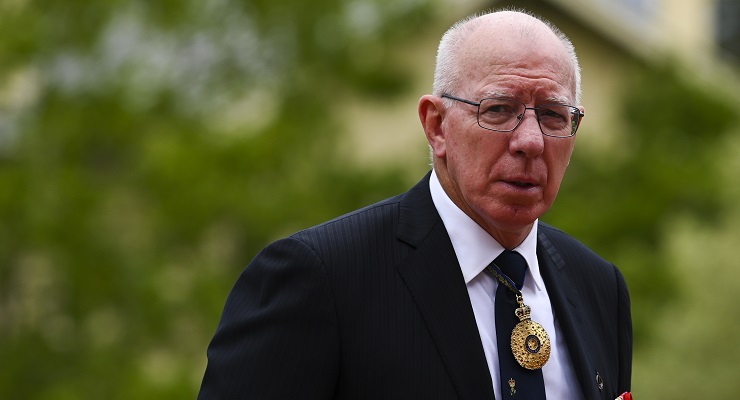
With the decision to award Australia’s highest honour to Margaret Court, it feels eerily as though Yes, Minister has come to Yarralumla, with Jim Hacker playing the role of a hapless governor-general rubber-stamping what is put in front of him.
What else are we to make of the situation? Just six months ago, governor-general David Hurley vowed in a statement to Crikey to restore confidence in an honours system battered by politicisation and skewed towards the wealthy and politically connected. He then proceeded to make a culture wars decision which recognises someone who for the last 30 years has campaigned relentlessly for extreme socially conservative values as founder and pastor of a Pentecostal church.
Court’s award is in fact a promotion. She was awarded an AO — the second highest Australian honour — in 2007, in the final year of the Howard government. The award recognised not only her extraordinary tennis career which ended in 1977 but also her “pastoral care” works in the community.
Since then little has changed. Court’s bio on her Victory Life Centre website says she is driven by the “desire to see God’s people equipped and trained to take back the seven mountains of society”. She is also trustee of the International Convention of Faith Ministries, a member of the Australian Pentecostal Ministers Fellowship Steering Committee, a patron of Drug Free Australia and also a patron of the Australian Family Association (AFA).
The AFA is an offshoot of the National Civic Council (NCC), founded by the social conservative and political activist BA Santamaria. As such it is a force which aims to make change in legislation and government policies which affect traditional families, sexuality and sexual orientation, as well as abortion and voluntary euthanasia. (Other NCC policies include backing the coal industry.)
Court received her first honour on the watch of the recently deceased governor-general Michael Jeffery — a Christian who, coincidentally perhaps, was also a patron of the Australian Family Association.
So whose idea was it to promote Margaret Court to a higher level of honour, provoke a backlash and further undermine belief in the honours — despite there being little or no change in her credentials?
We may never know the answer to that. As confirmed by a High Court decision, the governor-general’s office is exempt from freedom of information laws when it comes to making its reasons public.
Its standard answer has been that the awards are recommended by the Council for the Order of Australia, an “independent” group of 19 state and federal representatives. The council ploughs through hundreds of award recommendations put before it by a secretariat.
Thus a decision has a form of magic about it: it comes from nowhere in particular but from everywhere and everyone at the same time, with no single person responsible, including the governor-general who apparently agrees to what he’s given.
So, just for the fun of it, where might the Margaret Court idea have come from?
One lead is the West Australian link. A group of eight community representatives that are part of the larger council — and appointed on the recommendation of the Prime Minister — includes the long-time West Australian Liberal Cheryl Edwardes (AM), a former WA attorney-general.
Then there’s the Pentecostal link. The prime minister, of course, is a well-known Pentecostalist. There is also the prime minister’s point man, WA MP and fellow Pentecostal Ben Morton, who is attuned to the rising force of evangelical Christians in the WA Liberal Party.
There is also ample evidence that, as extreme as Court’s views might be, they are in line with a large rump of Liberal conservatives in the federal parliament who would have no trouble with her opposition to homosexuality, the transgender community and the Safe Schools program.
But what of the governor-general, a committed Christian appointed by Morrison? If nothing else, it is Hurley’s role to set a moral tone for the country, to use his office to reflect the diversity of Australia and to act as a uniting force. The Order of Australia awards are made in his name.
Yet he has consistently shied away from making interventions which might help salvage the reputation of the awards.
As we reported last year, Hurley has the power to strip honours from the likes of George Pell and former High Court justice Dyson Heydon, both of whom have been subject to serious allegations of misconduct since receiving their awards.
In the name of preserving the integrity of the system, Hurley was also entitled to act against men’s rights activist Bettina Arndt who last year outraged sections of the community over her comments which appeared to provide justification for a horrific domestic violence attack.
Yet the governor-general’s office has not acted. Instead it has set the bar that there must be a finding of guilt in court before an award will be removed — a position spelt out by the chairman of the Council of the Order of Australia and powerful Liberal Party stalwart, Shane Stone.
So on the eve of the Order of Australia awards for 2021, we’re still left in the dark on a basic question: who’s really calling the shots?








Crikey is committed to hosting lively discussions. Help us keep the conversation useful, interesting and welcoming. We aim to publish comments quickly in the interest of promoting robust conversation, but we’re a small team and we deploy filters to protect against legal risk. Occasionally your comment may be held up while we review, but we’re working as fast as we can to keep the conversation rolling.
The Crikey comment section is members-only content. Please subscribe to leave a comment.
The Crikey comment section is members-only content. Please login to leave a comment.